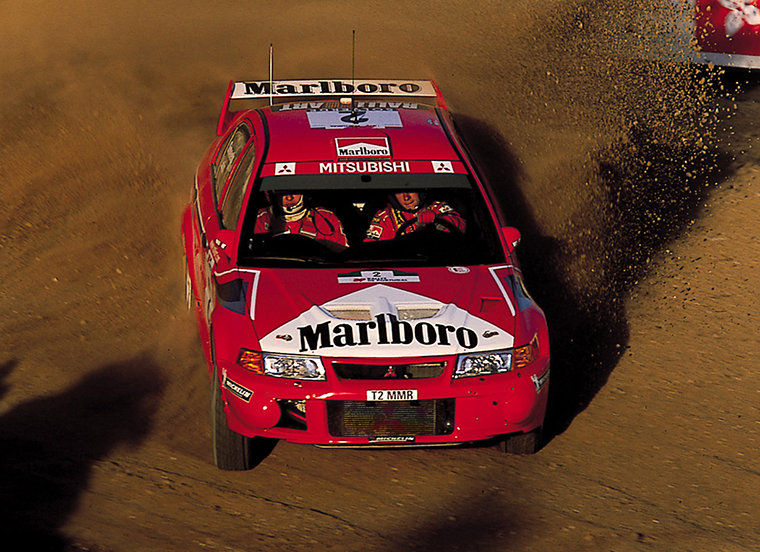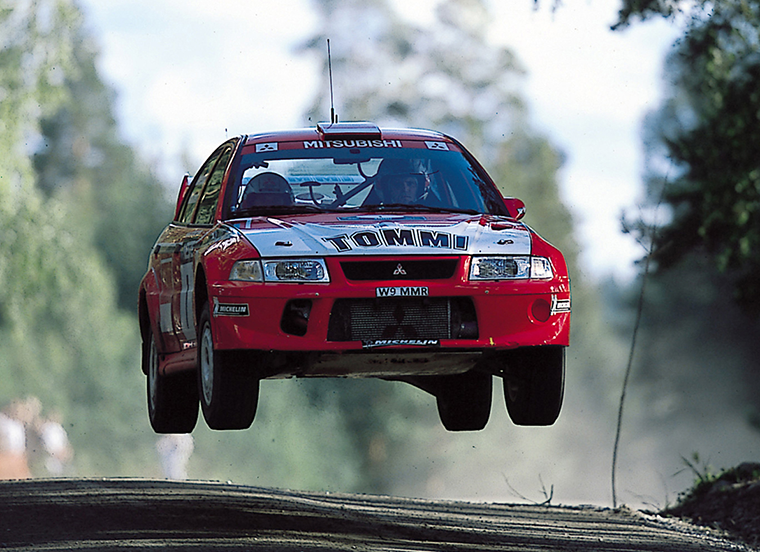WRC 2000
2000 World Rally Championship
For the last year of the millennium , in which the WR car regulations celebrated their fourth year of implementation, the 2000 World Rally Championship (WRC) was thriving with seven car makers competing for the title. While Toyota had withdrawn from competition at the end of the previous year, MITSUBISHI MOTORS responded present with their Group A machinery. This lively participation of so many manufacturers clearly emphasized the effects of WR car regulations. Tommi Mäkinen's Lancer Evolution VI won the opening Monte Carlo Rally for the second year in a row thanks to his wise tire choices and driving skills. In Rally Sweden that followed, Mäkinen fought a heated battle for the lead. He finally finished second, and although he did not get his third consecutive win in this rally, Mäkinen and his Group A LANCER EVOLUTION’s highly competitive performance were impressive.
| Rd. | name | Country |
|---|---|---|
| 1 | Rallye Monte Carlo | Europe, France, Africa and Monaco |
| 2 | Swedish Rally | Sweden |
| 3 | Safari Rally | Kenya |
| 4 | Rallye de Portugal | Portugal |
| 5 | Rally Catalunya | Spain |
| 6 | Rally Argentina | Argentina |
| 7 | Acropolis Rally | Greece |
| 8 | Rally New Zealand | New Zealand |
| 9 | Rally Finland | Finland |
| 10 | Cyprus Rally | Cyprus |
| 11 | Tour de Corse | France |
| 12 | Rallye Sanremo | Italy |
| 13 | Rally Australia | Australia |
| 14 | Rally of Great Britain | United Kingdom |
 However, the balance of power between the team and their rivals began to shift as they entered an all-out series of gravel and tarmac rallies. In order to compensate for the suspension stroke that proved a handicap against WR cars, the MITSUBISHI MOTORS team switched to a double spring suspension for the second round, Rally Sweden. An additional spring was fitted from the fourth round, Rally Portugal, making it a triple spring spec. Furthermore, they deployed a lighter 4G63 engine that provided further weight reduction from round five, Rally Catalunya. From round seven, Rally New Zealand, the clutch capacity of the center differential was increased, and the engine control unit computer was also renewed at the following event (round eight), Rally Finland. At the same time, the team introduced a front bumper with the same design as that of the LANCER EVOLUTION VI Tommi Mäkinen Edition, which was a special specification car released in January of that year, and continued to carry out a hard development work including a large-scale revision to the suspension geometry.
During this period, the team fell into a vicious cycle involving the setting. In order to try again to identify the problem, they returned the suspension back to the previous year’s specification at round ten, the Cyprus Rally. This paid off, with Mäkinen setting the fastest time in four special stages for the first time in a long while. He then finished third in round twelve, Rally Sanremo, and was in contention for the lead in the following Rally Australia. However, due to a regrettable misunderstanding, wrong parts were fitted on the car. During the final checks after the rally, it was discovered that the housing of the turbo was different in shape from the one that was submitted at the time of homologation. Consequently, it ended up in a disappointing way, with Mäkinen being disqualified. Pulling himself together, Mäkinen finished the season in third place at the final rally, the Rally of Great Britain.
However, the balance of power between the team and their rivals began to shift as they entered an all-out series of gravel and tarmac rallies. In order to compensate for the suspension stroke that proved a handicap against WR cars, the MITSUBISHI MOTORS team switched to a double spring suspension for the second round, Rally Sweden. An additional spring was fitted from the fourth round, Rally Portugal, making it a triple spring spec. Furthermore, they deployed a lighter 4G63 engine that provided further weight reduction from round five, Rally Catalunya. From round seven, Rally New Zealand, the clutch capacity of the center differential was increased, and the engine control unit computer was also renewed at the following event (round eight), Rally Finland. At the same time, the team introduced a front bumper with the same design as that of the LANCER EVOLUTION VI Tommi Mäkinen Edition, which was a special specification car released in January of that year, and continued to carry out a hard development work including a large-scale revision to the suspension geometry.
During this period, the team fell into a vicious cycle involving the setting. In order to try again to identify the problem, they returned the suspension back to the previous year’s specification at round ten, the Cyprus Rally. This paid off, with Mäkinen setting the fastest time in four special stages for the first time in a long while. He then finished third in round twelve, Rally Sanremo, and was in contention for the lead in the following Rally Australia. However, due to a regrettable misunderstanding, wrong parts were fitted on the car. During the final checks after the rally, it was discovered that the housing of the turbo was different in shape from the one that was submitted at the time of homologation. Consequently, it ended up in a disappointing way, with Mäkinen being disqualified. Pulling himself together, Mäkinen finished the season in third place at the final rally, the Rally of Great Britain.

The fifth place in the final ranking with a driver and a car that had won four consecutive titles until the previous year was nothing but a disappointment for MITSUBISHI MOTORS. At this point, MITSUBISHI MOTORS decided to change their tune and started the development of a new WR car. With that choice, MITSUBISHI MOTORS' rally activities moved on to a new stage.
Result
| Rd. | 1 | 2 | 3 | 4 | 5 | 6 | 7 | 8 | 9 | 10 | 11 | 12 | 13 | 14 |
|---|---|---|---|---|---|---|---|---|---|---|---|---|---|---|
| T. Mäkinen | 1st | 2nd | R | R | 4th | 3rd | R | R | 4th | 5th | R | 3rd | D | 3rd |
| R. Mannisenmäki | ||||||||||||||
| F. Loix | 6th | 8th | R | 6th | 8th | 5th | R | R | R | 8th | R | 8th | R | R |
| S. Smeets |
| Driver | Co-driver | R - Retired | D - Disqualified |
| Rd. | 1 | 2 | 3 | 4 |
|---|---|---|---|---|
| T. Mäkinen | 1st | 2nd | R | R |
| R. Mannisenmäki | ||||
| F. Loix | 6th | 8th | R | 6th |
| S. Smeets |
| 5 | 6 | 7 | 8 | 9 | 10 | 11 |
|---|---|---|---|---|---|---|
| 4th | 3rd | R | R | 4th | 5th | R |
| 8th | 5th | R | R | R | 8th | R |
| 12 | 13 | 14 |
|---|---|---|
| 3rd | D | 3rd |
| 8th | R | R |
Driver
Co-driver
R - Retired
D - Disqualified
Spec
LANCER Evolution Ⅵ
| Overall length | 4,350 mm |
|---|---|
| Overall width | 1,770 mm |
| Engine model | 4G63 4-cylinder DOHC turbo |
| Displacement | 1,997 cc |
| Maximum output | 290 ps |
| Maximum torque | 52 kg-m |
